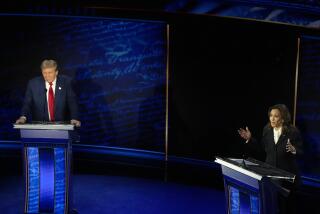Powell & Clinton: 2 Sides of a Coin : Politics: On quotas, school prayer, gun control and values, there’s not a dime’s worth of difference between the two.
- Share via
Gen. Colin Powell is trying to position himself above partisanship, saying that neither party “fits me comfortably in its present state.” He attacked “Gingrichian” plans to replace the welfare state: “Government still bears the responsibility.” He also said that the Democrats stand for little “except for more spending, big government and ‘let’s get a program.’ ” In another interview, he mourned “the intellectual death of the Democratic Party.”
Three years ago, another rising star said the same things: “I reject brain-dead politics of both parties--the wrongheaded Republican notion that prosperity will trickle down if we just make the rich richer and get government out of the way, and the old Democratic orthodoxy that there’s a government program for every problem, and we can tax and spend and regulate our way to prosperity.”
That was Bill Clinton on Aug. 21, 1992.
The similarity fits a broad and troubling pattern. On issue after issue, Powell is not just taking Clintonian politics, but he is echoing the President’s arguments and rhetoric.
On abortion, here is Powell: “If a woman becomes pregnant and does not wish the child, I would hope she would carry the child to term and then put the child up for adoption. If, however, it is her choice to abort, it’s a matter between her, her doctor, her family and her conscience and God.”
President Clinton, in a 1994 children’s television special: Abortion “should be legal, but is should be rare. I think we should liberalize the adoption laws. I think we should encourage people to adopt children . . . In my own view, I support the decision of the Supreme Court that this decision ought to be a matter between women and their doctors.”
On school prayer, here is Powell: “I have no problem if on arriving at a school a quiet moment is allowed for a child to do whatever the child wishes to do in that private moment. I would be against any sort of structure that says ‘You will come in and you will pray’ and anything of that nature.”
And Clinton: “I think we could waste a lot of energy trying to revisit the extent to which the government could order people to be involved in prayer or order prayer services. But I think that it’s OK for schools to permit moments where people can pray on their own if that’s what they want to do.”
On firearms, Powell: “I am a gun owner. Firmly believe in the Second Amendment right to bear arms. I have rifles, pistols, shotguns, but at the same time, I am willing to put up with some level of inconvenience in acquiring guns or having guns in my possession to make sure that I am a responsible citizen who should be allowed to have a gun.”
Clinton, in his 1995 State of the Union address: He “would never do anything to infringe on the right to keep and bear arms to hunt and to engage in other appropriate sporting activities. I’ve done it since I was a boy, and I’m going to keep right on doing it until I can’t do it any more.” At a Chicago fundraiser in June, however, he said that “it is your responsibility to go through the minor inconvenience of waiting five days so we can keep people who have got no business buying guns from buying guns.”
And on a more general matter, Powell criticizes “rhetorical nonsense and demagoguery about the word values .”
In his 1992 acceptance speech, Clinton said: “Frankly, I’m fed up with the politicians in Washington lecturing the rest of us about family values.”
The list goes on and on: Both support the death penalty and oppose moneyed special interests. Both endorse affirmative action, but attempt to distinguish racial preferences from racial quotas.
A Powell-Clinton contest would ooze with irony. For years, voters have been telling pollsters that they are sick of limited choices and issueless campaigns that revolve around personalities. But the only significant differences between Powell and Clinton would consist of personality and character. On the issues, they would offer the electorate no choice at all.
More to Read
Get the L.A. Times Politics newsletter
Deeply reported insights into legislation, politics and policy from Sacramento, Washington and beyond. In your inbox twice per week.
You may occasionally receive promotional content from the Los Angeles Times.










